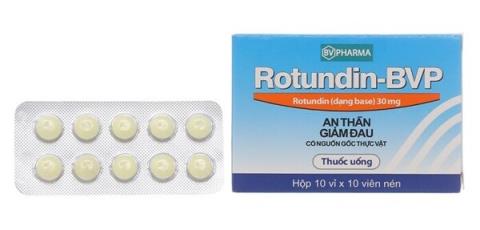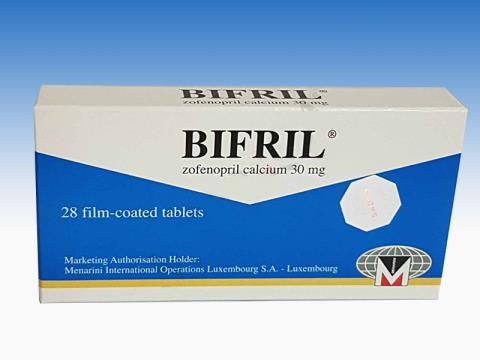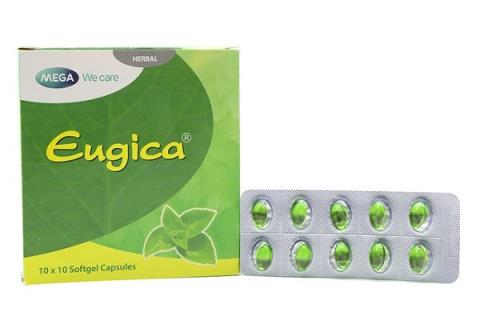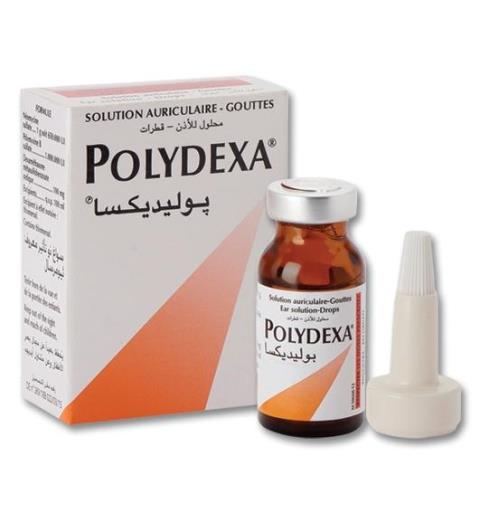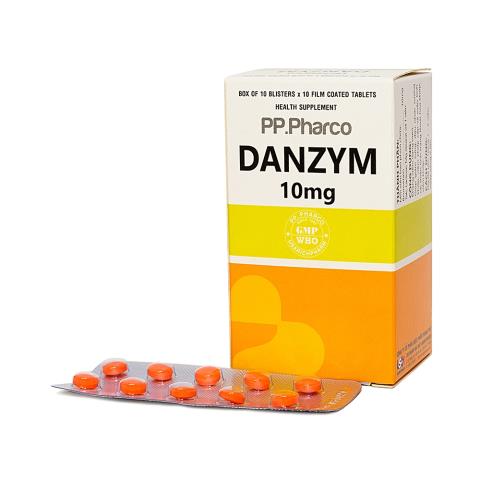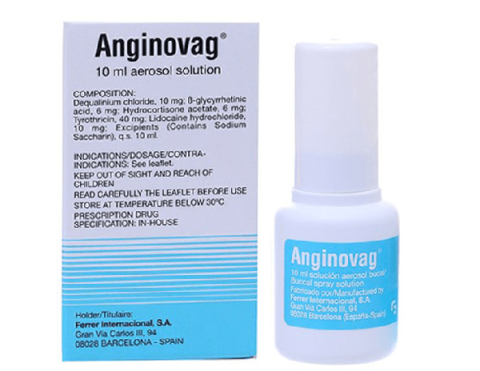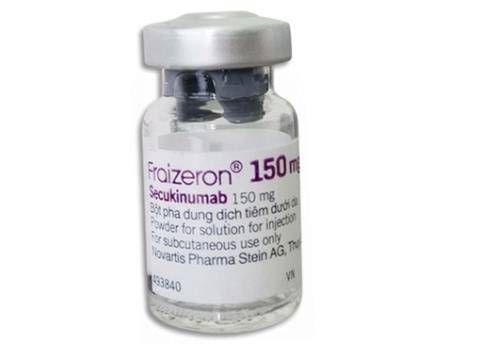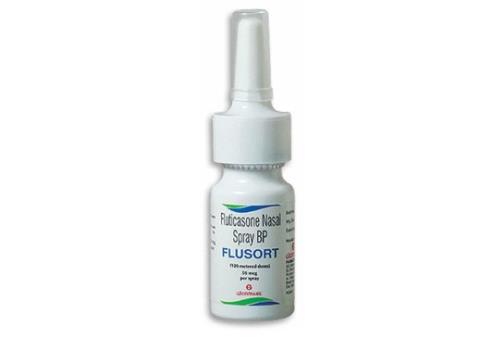Bifril (zofenopril) is used to treat mild to moderate high blood pressure and heart attack. Bifril (zofenopril) is available by prescription . So how is this drug used and what are the precautions to know? Let's find out the necessary information about Bifril (zofenopril) through the following SignsSymptomsList article.
Active ingredient: Zofenopril calcium…
content
1. What is Bifril (zofenopril)?
Bifril contains zofenopril calcium, which belongs to the group of angiotensin-converting enzyme inhibitors. This is a group of drugs used to treat high blood pressure.
2. Indications of the drug Bifril (zofenopril)
Bifril (zofenopril) is used to treat:
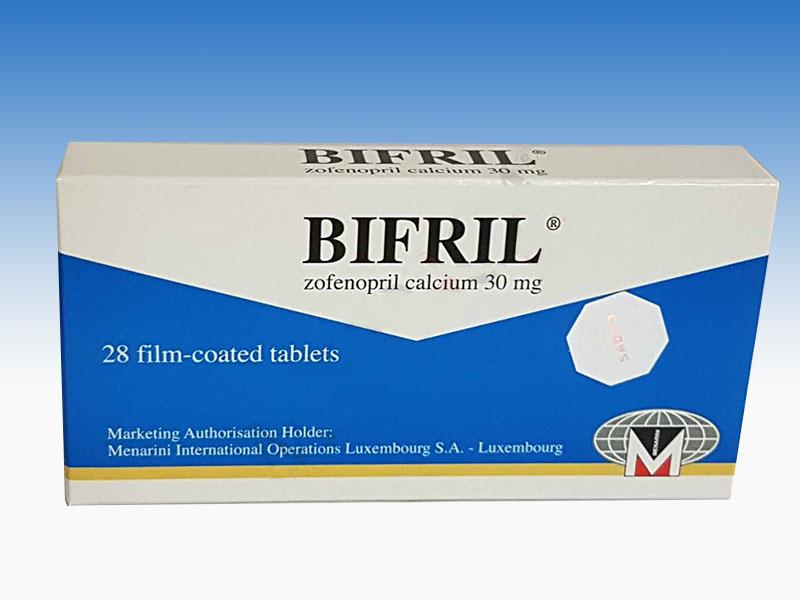
Illustration of a box of Bifril (zofenopril).
3. Dosage and administration of Bifril (zofenopril)
Take Bifril (zofenopril) as directed by your doctor. Take the medicine with water. It can be taken with a meal or on an empty stomach. The dosage below is for reference only:
3.1. Treatment of high blood pressure
The usual starting dose is 15mg once daily. The dose will be gradually adjusted by the doctor to the most suitable dose for each person's condition (usually after 4 weeks). Effective long-term treatment of hypertension is usually achieved at a dose of 30mg, once a day. Maximum dose: 60mg, divided into 1-2 times/day.
In case if you are dehydrated, salted or on diuretics, it may be a good idea to start with a dose of 7.5mg.
3.2. Liver/kidney failure
If you have mild to moderate liver failure or moderate to severe kidney failure, your doctor will start you on a lower dose (1/2 of the usual dose). If you are on dialysis, start treatment at ¼ of the usual dose.
3.3. Stroke (acute myocardial infarction)
Bifril should be started within the first 24 hours after symptom onset. The usual dose is 2 times / day in the morning and evening, specifically:
- 7.5mg, twice daily, on days 1 and 2.
- 15mg, twice a day, on days 3 and 4.
- 30mg, 2 times/day, from day 5 onwards.
Your dose will be adjusted by your doctor according to your blood pressure level. The regimen can be continued for the next 6 weeks or longer if symptoms of heart failure persist.
4. Contraindications of Bifril (zofenopril)
Do not use Bifril (zofenopril) if:
- Hypersensitivity to any ingredient of the drug
- History of allergy to other ACE inhibitors (eg, captopril, enalapril)
- There has been a history of severe swelling and itching in the area around the face, nose, and throat (neuroedema) related to ACE inhibitors or due to genetic factors (rapidly progressive swelling of the skin, soft tissues, gastrointestinal tract) chemistry and other agencies)
- Severe liver failure
- Renal artery stenosis
- Pregnant women over 3 months
- Women of childbearing potential unless effective contraception is used
- Diabetes, kidney failure, being treated with blood pressure medicine containing aliskiren.
If you experience any side effects while taking the medicine, notify your doctor or pharmacist immediately. In severe cases, you need to go to the nearest medical center for support.
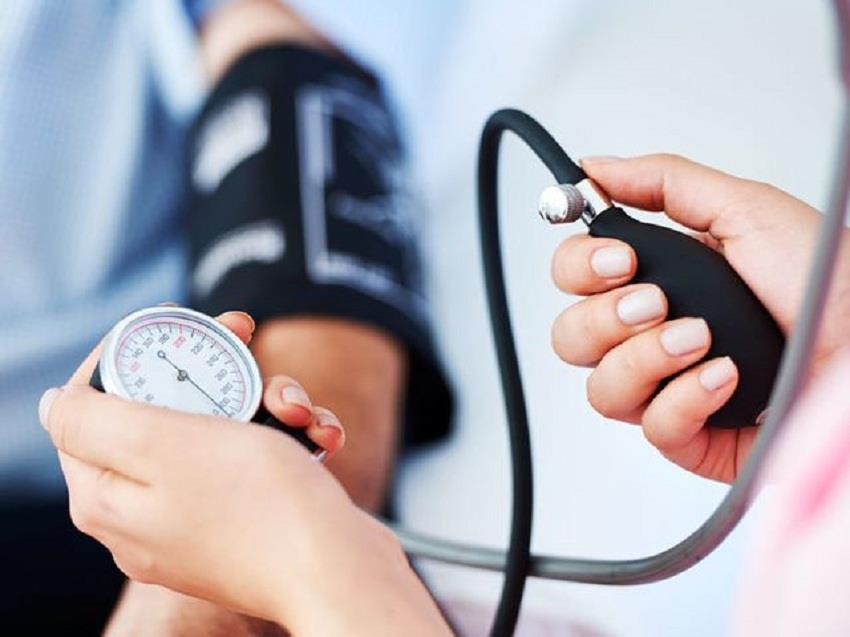
It is necessary to regularly monitor blood pressure at home.
5. Note when using
Talk to your doctor before taking Bifril if you have:
- Having high blood pressure but with liver and kidney disease
- Hypertension due to kidney disease, renal artery stenosis (renal arterial hypertension)
- Just had a kidney transplant
- Dialysis in progress
- On dialysis for LDL type
- Abnormally high levels of aldosterone in the blood (primary hyperaldosteronism)
- Heart valve stenosis (aortic stenosis), thickened walls of the heart (myocardial hypertrophy)
- Have or have ever had psoriasis?
- Currently implementing a desensitization regimen for insect venom
- Are you taking the following medicines for high blood pressure: aliskiren, angiotensin II receptor blockers (valsartan, telmisartan, irbesartan, etc.), especially if you have diabetes-related kidney problems
You will likely have your kidney function, blood pressure, and electrolyte (potassium) levels checked regularly
When taking Bifril, blood pressure can go very low, especially after the first dose (more often if you've been dehydrated, have eaten low salt, taken diuretics). Tell your doctor immediately and lie down if this happens.
If you are going to have surgery, tell the anesthesiologist that you are taking Bifril before the anesthesia
If you have a concussion and:
- Low blood pressure (<100mmhg) or "shock="" decrease="" can="" volume="" week="" refund="" (due to="" disease="" heart).="" no="" recommended="" ad="" use="">
- Over the age of 75, Bifril should be used with caution
The drug can cause dizziness, fatigue, attention when doing activities that require concentration such as driving or operating machinery.
This medicine contains lactose, tell your doctor if you have problems tolerating some forms of sugar.
6. Undesirable effects
Some common side effects that you may experience when you take Bifril (zofenopril):
- Tired
- Nausea, vomiting
- dizziness
- Headache
- Cough
- Muscle cramps
- Erythema on the skin
- Swelling, itching, rapid progression, especially around the face, mouth, and throat, possibly with difficulty breathing.
Most side effects are reversible and disappear once the medication is stopped.
If you experience any unwanted effects while taking this medicine (including side effects that are not listed), tell your doctor or pharmacist right away. In severe cases, you need to go to the nearest medical center for support.

Headache is one of the side effects when taking Bifril.
7. Interactions with Bifril (zofenopril)
Inform your doctor about the drugs (including prescription and over-the-counter drugs, vitamins, herbal medicines, etc.) and foods that you are taking. Especially for:
- Medicines that increase blood potassium levels (potassium-sparing diuretics such as spironolactone, triamterone, amiloride, or potassium supplements)
- Lithium (in the treatment of psychological disorders)
- Anesthetics, tranquilizers (such as morphine), antipsychotics (in the treatment of schizophrenia or similar conditions), tricyclic antidepressants (such as amitriptilin)
- Other antihypertensives and vasodilators (including beta-blockers, alpha-blockers, diuretics such as hydrochlorothiazide, furosemide), angiotensin II receptor blockers, or aliskiren
- Nitroglycerin or other nitrates (in the treatment of angina)
- Antacids such as cimetidine (in the treatment of stomach ulcers, belching)
- Cyclosporin and other immunosuppressive drugs
- Allopurinol (treatment of gout)
- Insulin and oral antidiabetic drugs
- Cytotoxic drugs (treatment of cancer or immune-related diseases)
- Corticosteroids (strong anti-inflammatory drugs)
- Procainamide (treatment of cardiac arrhythmias)
- Non-steroidal anti-inflammatory drugs (NSAIDs, such as aspirin, ibuprofen)
- Sympathomimetic drugs (including some asthma, hay fever, or heart rate-promoting amines such as adrenaline)
For food and drinks, Bifril can be taken with meals and when hungry, take it with filtered water. Alcohol enhances the blood pressure lowering effect of Bifril, you should consult your doctor if you must drink alcohol during treatment with this medicine.
8. Overdose with Bifril (zofenopril)
Some common symptoms if you take too much medicine are low blood pressure, possible fainting, slow heart rate, changes in blood electrolyte levels, kidney failure.
If you accidentally overdose, notify your doctor, pharmacist or nearest emergency department immediately (recommended to bring the remaining amount of medicine, the box or the leaflet attached). In case of any serious reactions suspected of overdose, it is necessary to go to the nearest medical center for assistance.

You should see your doctor if you experience any unusual problems.
9. Special Objects
Children and adolescents: Bifril is not recommended for children and adolescents under 18 years of age.
Pregnant women: talk to your doctor if you are pregnant or plan to become pregnant. In general, Bifril should be stopped before becoming pregnant or as soon as possible after learning that you are pregnant. It is necessary to substitute other drugs for the treatment of hypertension. Bifril is not recommended for use in the early stages of pregnancy, and is contraindicated after the first 3 months of pregnancy, because it can harm the baby.
See more articles: Is it safe to use drugs during pregnancy?
Lactation: Talk to your doctor if you are breast-feeding or plan to breastfeed. Bifril is not recommended for use during lactation. It is necessary to substitute other drugs for the treatment of hypertension, especially in newborns or premature infants.
10. How to store Bifril (zofenopril)
Store in a dry place, avoid direct sunlight on the product. Keep the medicine at a temperature below 30oC, avoid places with too high or too low temperature. The product should be stored in a safe place, out of reach of children and pets
Thus, Bifril is indicated for the treatment of mild to moderate hypertension and cardiac stroke. Bifril is a prescription drug. The above information is for reference only . If you have any problems, you should consult a cardiologist for the most specific advice.
Pharmacist Tran Van Thy
